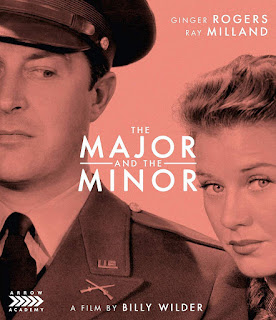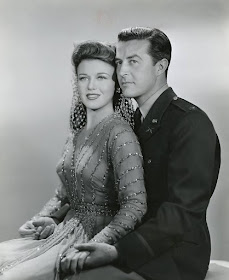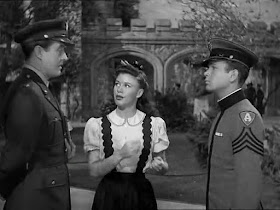 ‘Arrow Academy’ have recently released a digitally enhanced version of ‘The Major and the Minor’. It was directed by Billy Wilder; it starred Ginger Rogers, Ray Milland, and Rita Johnson; and it lasts for 100-minutes. Plus, as an extra added bonus, the Blu-ray edition comes with an image gallery, the original theatrical trailer, an hour-long radio adaptation, a visual essay voiced by Neil Sinyard, an archival interview featuring Ray Milland, as well as a brand new audio commentary provided by the film scholar, Adrian Martin. Please enjoy.
‘Arrow Academy’ have recently released a digitally enhanced version of ‘The Major and the Minor’. It was directed by Billy Wilder; it starred Ginger Rogers, Ray Milland, and Rita Johnson; and it lasts for 100-minutes. Plus, as an extra added bonus, the Blu-ray edition comes with an image gallery, the original theatrical trailer, an hour-long radio adaptation, a visual essay voiced by Neil Sinyard, an archival interview featuring Ray Milland, as well as a brand new audio commentary provided by the film scholar, Adrian Martin. Please enjoy. The Major and the Minor [Arrow Academy]
THE STORY:
How do I tell him? How do I tell Major Kirby (Ray Milland) that I’m not the person he thinks I am? I mean, do I just come out and tell him the truth, the whole truth, and nothing but the truth? So help me God! Or do I just act naturally and say that I’m a 25-year-old woman looking for love?
Well, when we first met, a few days ago on the train, I pretended to be a 12-year-old schoolgirl -- I repeat, a 12-year-old schoolgirl -- because I couldn’t afford the adult fare and desperately wanted to make my way back home. But then, halfway through my journey, the train got stranded, I got confused, and the Major got slapped by his fiancée, Pamela (Rita Johnson), on account of her thinking that the two of us were having an affair.
Well, when we first met, a few days ago on the train, I pretended to be a 12-year-old schoolgirl -- I repeat, a 12-year-old schoolgirl -- because I couldn’t afford the adult fare and desperately wanted to make my way back home. But then, halfway through my journey, the train got stranded, I got confused, and the Major got slapped by his fiancée, Pamela (Rita Johnson), on account of her thinking that the two of us were having an affair.
But no. We weren’t having an affair! The only thing we were having was some time together on a train that suddenly broke down in the middle of nowhere. So, to make things better between the two of them, I agreed to go along with the Major to their mutual place of work, a military school for boys, in order to sort things out before setting my sights on pastures old. Or so I thought, which is most probably why what next transpires goes boom, bang, bing, when I say to myself, ‘Susan (Ginger Rogers)? Are you in love with a military man?’. As a school full of boys take their turn – a love affair begins to crash and burn – a confused schoolgirl pretends to learn – and at the end of the day, please remember, true romance makes your heart perpetually yearn.
THE REVIEW:
‘The Major and the Minor’ was the first American film directed by the late, great, Billy Wilder, and in a strange way, featured a number of concepts he played with throughout his entire career. In ‘Some Like it Hot’, for instance, he managed to set up a situation where someone had to pretend to be somebody else. Whereas in ‘The Apartment’, on the other hand, he was able to highlight the numerous ways men and women relate and interact with each other, ranging from the friendly to the fierce.
Although, in this particular instance, I did notice something slightly different about Billy’s work. Something patriotic, which I presume is connected to him co-writing this flick a few months prior to the attack on Pearl Harbor; as well as something strangely silly, which I put down to the fairly taboo subject he was trying to explore.
After all, the basic crux of this story revolved around a lady who pretended to be an adolescent because she wanted to get away from a parade of sexually repressed men. But in doing so, she inadvertently met up with a man she actually likes, a man that’s engaged to a very manipulative woman, who she then tries to outsmart with some help from a parade of sexually repressed boys.
Ironic, I know! But then again, this is a somewhat ironic film, as it managed to charm us with a jovial pretext, a subliminal message, and a cast of characters that come fresh out of a 1940s comic strip. A cast that included a woman that’s so bold she pretends to be younger than she is, a man that’s so simple-minded he’s outsmarted by two emotional women, as well as a gang of boys that’s so cheeky you don’t mind that they’re all flirting with an older lady. Similarly, the overall look and design of this film is somewhat reminiscent of a comic strip too. Not only because visually everything looked bright, crisp, and clear on the screen, but in addition to this, the story's actual tone is something that isn’t taken very seriously either, and that’s reflected in the jokes it tells, the music it plays, and the manner in which no one takes offense but seems to be having fun.
Anyway, that’s enough of that for the time being, because now I think we should all sit back, relax, and check out the following filmic facts: (1) ‘Paramount’ first released this production in New York, New York on the exact same day the German Army penetrated the northwest suburbs of Stalingrad. It was on the 16th of September, 1942. (2) This film was partly based on a stage play written by Edward Childs Carpenter called ‘Connie Goes Home’. (3) Loosely translated, this project was entitled ‘The Amazing Suzana’ in Brazil, ‘Forbidden Fruit’ in Italy, and ‘Cadet Flame’ in Sweden. (4) One of the taglines used to promote this picture, states, ‘Is She A Kid - Or Is She Kidding?’. (5) The majority of this movie was shot inside Paramount Studios, located at 5555 Melrose Avenue, Hollywood, Los Angeles, even though some of it was also shot in and around St. John's Military Academy, situated at 1101 North Genesee Street, Delafield, Wisconsin. (6) In 1943, the "Lux Radio Theater" broadcast a 60-minute radio version of this movie, with Ginger Rogers and Ray Milland reprising their respective roles. (7) The woman who played Ginger Rogers’s mother in this film is, in fact, Ginger Rogers’s mother, Lela E. Rogers. (8) In 1955, this movie was remade into the Dean Martin and Jerry Lewis comedy, 'You're Never Too Young', with the only notable difference being that Jerry played ‘the kid’ and Diana Lynn played ‘the adult’. The same Diana Lynn who played the part of Lucy Hill in this movie!
In closing my review of ‘The Major and the Minor’, I would just like to say how much I loved watching the performances given by all of the principal actors. Ray Milland, for instance, did a wonderful job at playing a wholesome yet naive military man that’s one part gallant and one part paternal. Whereas Rita Johnson and Diana Lynn, on the other hand, seemed to complement each other in both looks and mystique, despite each being the yin to the others yang. And as for Ginger Rogers? Well, what can I say about her? Apart from the fact that she was so amazing as the central character, Susan, I sometimes forgot that she was a 25-year-old woman posing as a 12-year-old girl. Seriously, folks, she’s just that good, no doubt about it, as I was genuinely amazed by her impersonation skills, her charisma and charm, as well as the way she said more with a passing look than with a sentence of unneeded dialogue.
I would also like to give a shout out to some of the 'Cadets' that featured in this film as well. Mainly, my top three Cadets, which includes: Raymond Roe (Cadet Anthony Wigton Jr.), because his serious demeanor worked wonders against Ginger's bubbly personality; Larry Nunn (Cadet Babcock), largely due to his coy New York swagger and his laid back attitude; and finally, Frankie Thomas (Cadet Osborne), as he strangely came across as a younger version of Josh Brolin.
That said, however, there was something about this film that I wasn’t too sure about. Something subliminal, perhaps, but still worth mentioning all the same. Well, without giving too much away, by the end of the film it was finally revealed that Ray Milland’s character is attracted to Ginger Rogers’s character, keeping in mind that he’s always known her to be a 12-year-old girl. So, to some extent, that kinda makes him out to be a bit of a pervert. A patriotic pervert, admittedly, but a pervert nonetheless. Or alternatively, maybe he’s a very, very forgetful person, or a very, very naive nincompoop, in which case, he shouldn’t be in the military and he shouldn’t be involved with a war! That’s unless it’s a game of tug-of-war, ha!
Seriously, though, folks, aside from that slight gripe, by and large, this was a truly amazing film and I would highly recommend it to those of you who are fans of Billy Wilder, patriotic parodies, as well as rom-coms with a mischievous edge.
THE RATING: A
‘The Major and the Minor’ was the first American film directed by the late, great, Billy Wilder, and in a strange way, featured a number of concepts he played with throughout his entire career. In ‘Some Like it Hot’, for instance, he managed to set up a situation where someone had to pretend to be somebody else. Whereas in ‘The Apartment’, on the other hand, he was able to highlight the numerous ways men and women relate and interact with each other, ranging from the friendly to the fierce.
Although, in this particular instance, I did notice something slightly different about Billy’s work. Something patriotic, which I presume is connected to him co-writing this flick a few months prior to the attack on Pearl Harbor; as well as something strangely silly, which I put down to the fairly taboo subject he was trying to explore.
After all, the basic crux of this story revolved around a lady who pretended to be an adolescent because she wanted to get away from a parade of sexually repressed men. But in doing so, she inadvertently met up with a man she actually likes, a man that’s engaged to a very manipulative woman, who she then tries to outsmart with some help from a parade of sexually repressed boys.
Ironic, I know! But then again, this is a somewhat ironic film, as it managed to charm us with a jovial pretext, a subliminal message, and a cast of characters that come fresh out of a 1940s comic strip. A cast that included a woman that’s so bold she pretends to be younger than she is, a man that’s so simple-minded he’s outsmarted by two emotional women, as well as a gang of boys that’s so cheeky you don’t mind that they’re all flirting with an older lady. Similarly, the overall look and design of this film is somewhat reminiscent of a comic strip too. Not only because visually everything looked bright, crisp, and clear on the screen, but in addition to this, the story's actual tone is something that isn’t taken very seriously either, and that’s reflected in the jokes it tells, the music it plays, and the manner in which no one takes offense but seems to be having fun.
Anyway, that’s enough of that for the time being, because now I think we should all sit back, relax, and check out the following filmic facts: (1) ‘Paramount’ first released this production in New York, New York on the exact same day the German Army penetrated the northwest suburbs of Stalingrad. It was on the 16th of September, 1942. (2) This film was partly based on a stage play written by Edward Childs Carpenter called ‘Connie Goes Home’. (3) Loosely translated, this project was entitled ‘The Amazing Suzana’ in Brazil, ‘Forbidden Fruit’ in Italy, and ‘Cadet Flame’ in Sweden. (4) One of the taglines used to promote this picture, states, ‘Is She A Kid - Or Is She Kidding?’. (5) The majority of this movie was shot inside Paramount Studios, located at 5555 Melrose Avenue, Hollywood, Los Angeles, even though some of it was also shot in and around St. John's Military Academy, situated at 1101 North Genesee Street, Delafield, Wisconsin. (6) In 1943, the "Lux Radio Theater" broadcast a 60-minute radio version of this movie, with Ginger Rogers and Ray Milland reprising their respective roles. (7) The woman who played Ginger Rogers’s mother in this film is, in fact, Ginger Rogers’s mother, Lela E. Rogers. (8) In 1955, this movie was remade into the Dean Martin and Jerry Lewis comedy, 'You're Never Too Young', with the only notable difference being that Jerry played ‘the kid’ and Diana Lynn played ‘the adult’. The same Diana Lynn who played the part of Lucy Hill in this movie!
In closing my review of ‘The Major and the Minor’, I would just like to say how much I loved watching the performances given by all of the principal actors. Ray Milland, for instance, did a wonderful job at playing a wholesome yet naive military man that’s one part gallant and one part paternal. Whereas Rita Johnson and Diana Lynn, on the other hand, seemed to complement each other in both looks and mystique, despite each being the yin to the others yang. And as for Ginger Rogers? Well, what can I say about her? Apart from the fact that she was so amazing as the central character, Susan, I sometimes forgot that she was a 25-year-old woman posing as a 12-year-old girl. Seriously, folks, she’s just that good, no doubt about it, as I was genuinely amazed by her impersonation skills, her charisma and charm, as well as the way she said more with a passing look than with a sentence of unneeded dialogue.
I would also like to give a shout out to some of the 'Cadets' that featured in this film as well. Mainly, my top three Cadets, which includes: Raymond Roe (Cadet Anthony Wigton Jr.), because his serious demeanor worked wonders against Ginger's bubbly personality; Larry Nunn (Cadet Babcock), largely due to his coy New York swagger and his laid back attitude; and finally, Frankie Thomas (Cadet Osborne), as he strangely came across as a younger version of Josh Brolin.
That said, however, there was something about this film that I wasn’t too sure about. Something subliminal, perhaps, but still worth mentioning all the same. Well, without giving too much away, by the end of the film it was finally revealed that Ray Milland’s character is attracted to Ginger Rogers’s character, keeping in mind that he’s always known her to be a 12-year-old girl. So, to some extent, that kinda makes him out to be a bit of a pervert. A patriotic pervert, admittedly, but a pervert nonetheless. Or alternatively, maybe he’s a very, very forgetful person, or a very, very naive nincompoop, in which case, he shouldn’t be in the military and he shouldn’t be involved with a war! That’s unless it’s a game of tug-of-war, ha!
Seriously, though, folks, aside from that slight gripe, by and large, this was a truly amazing film and I would highly recommend it to those of you who are fans of Billy Wilder, patriotic parodies, as well as rom-coms with a mischievous edge.
THE RATING: A
THE MAJOR AND THE MINOR (1942)
 Reviewed by David Andrews
on
September 23, 2019
Rating:
Reviewed by David Andrews
on
September 23, 2019
Rating:
 Reviewed by David Andrews
on
September 23, 2019
Rating:
Reviewed by David Andrews
on
September 23, 2019
Rating:








No comments:
Post a Comment